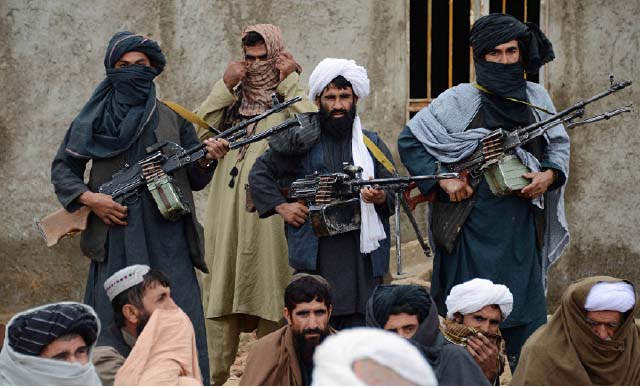With the efforts going on for resuming talks with the Taliban, the group has announced new conditions for entering in peace talks with the Afghan government. A statement issued by the Taliban said that the group’s representatives participating in a peace conference in Qatar have explained the conditions to the participants. The Qatar peace conference, organized by the peace advocacy group Pugwash, was attended by Taliban’s Qatar office representatives and politicians and foreign government ministers of Afghanistan. Recognition of Taliban’s political office in Qatar, exclusion of Taliban leaders from the UN blacklist, release of Taliban prisoners and cessation of “poisoning propaganda” against the Taliban are among the conditions set by the group for resumption of peace negotiations.
The conditions announced by the Taliban are coming shortly after the Quadrilateral Coordination Group – consisted of Afghanistan, US, Pakistan and China – called on the group to enter peace talks with the Afghan government. In reaction to the Taliban statement, the Afghan government has said that implementation of demands such as excluding Taliban names from the UN blacklist is not in authority of “individuals or a group”, and will require some specific criteria. A presidential spokesman, whoever, has once again reiterated on the government’s previously-stated demand for the militants denouncing violence and ceasing war to qualify for peace talks. In spite of saying that the Afghans would not accept talks with the militant groups who make preconditions, the presidential statement falls short of specifically ruling out considering the Taliban’s conditions set for coming to table of peace negotiations.
A considerable change of tone can be noticed in the Taliban’s peace conditions stated in the Qatar peace conference. Previously, the Taliban insisted on immediate withdrawals of foreign troops as a precondition for coming to peace talks with the Afghan government. Also, its stated goal from a peace deal was to establish a Sharia system in Afghanistan. This is while the Afghan government has been ruling out making any compromises over the country’s constitution as well as presence of foreign troops in the country for an unforeseeable period of time. This time, there is no such apparent uncompromising stance from the Taliban for the peace efforts. This could be an important sign that the Taliban might be preparing for not only coming to peace talks but also for making compromises in a peace process.
In case of being prepared to come to the table of negotiations, it is important for the Taliban to remain realistic and not set preconditions to which they will not be able to stick once a real peace process starts. The Taliban leaders seem to be aware of such an imperative for the group. The Taliban know well that they need to be able to impose their peace-related decisions on the vast spectrum of the group’s field commanders and fighters. Making uncompromising peace conditions by Taliban leaders would raise expectations among the Taliban ranks, making it hard for potential compromises in the future. This is particularly important given the Taliban’s internal problems. Despite overseeing most of the Taliban fighters, the main Taliban faction led by Mullah Mansoor already suffers from the recent split in the once unified Taliban movement. Many of Taliban members remain deeply disillusioned with the group while many others part ways with the group by joining rival groups such as the Islamic State.
In previous years, the Taliban considered the Afghan government as incompetent for peace talks as the US led the international coalition fighting the Taliban insurgency. The group insisted for direct peace negotiations with the United States. However, now as the US has ended its combat mission in Afghanistan, the Taliban is finding it inevitable to talk with the government once it considered as dependent to the US. Acknowledging this, the Taliban has suggested that Afghans will have the capacity and willingness to resolve the issues that relate to Afghans. This seems to be an unprecedented acknowledgement by the Taliban of the Afghan government being the main side of the war and peace issues. The Taliban have asked for direct talks between the group and the US over issues related to foreign troops particularly US presence in Afghanistan. The Taliban will try to include immediate and complete withdrawal of foreign troops in a possible peace deal. However, they have clearly avoided making it a precondition for the whole peace process, which again indicates their caution as not setting uncompromising preconditions.
The peace conditions stated by the Taliban really matter for the possible future peace talks. Everything included in the ‘demand package’ seem to be decided thoroughly and carefully. The Taliban leadership had sufficient time to make the decisions for setting peace conditions. The previous talks, which stalled after announcement of the group’s founder Mullah Omar, provided insight and time for the Taliban to ponder over peace talks with the Afghan government and a possible peace deal ending the conflict. On the other hand, the current preparations for peace talks are led by the four-way initiative which includes Pakistan. And it would be difficult for the Taliban to oppose the role Pakistan plays in the process. Therefore, Taliban have carefully chosen the issues as their conditions for coming to the table of negotiations. They are aware of the limitations existing for them which can create troubles for the group in the future.
Overall, the Taliban have made relatively compromising demands compared to the group’s previous peace preconditions. For the Afghan government struggling to bring Taliban to the table of negotiations, these are cheaper demands than the previous ones.
The Afghan government will find itself inevitable of granting political and financial concessions to the Taliban once the negotiations start. At current stage, the conditions set by Taliban my seem difficult for the Afghan government to accept, but it may come to the point to consider even more greater concessions than what are demanded for resumption of the negotiations.
Home » Opinion » Taliban’s Peace Conditions
Taliban’s Peace Conditions
| Abdul Ahad Bahrami

